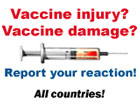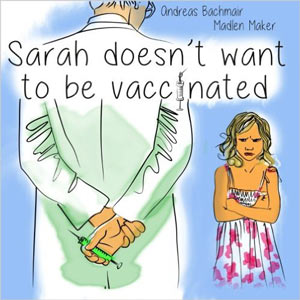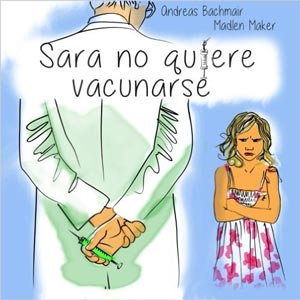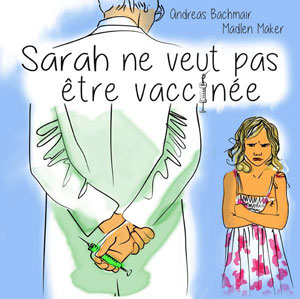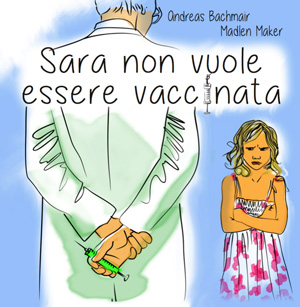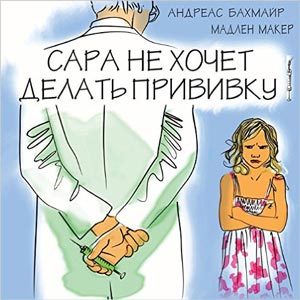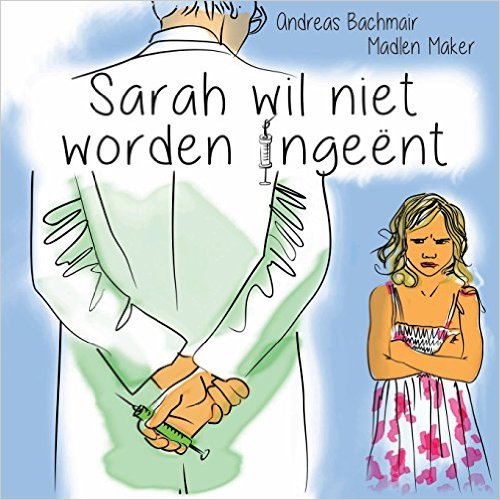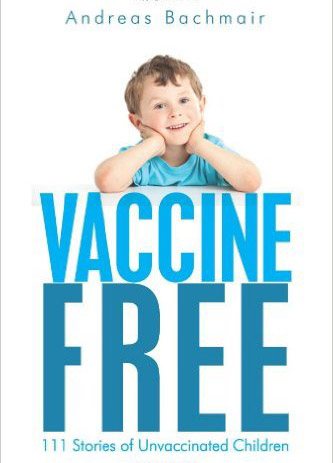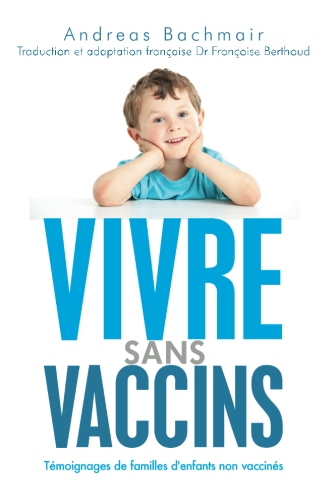Haemophilus influenza Type b (Hib) Vaccination
Vaccine
Hib is administered in itself or together with other vaccines as a 5-fold or 6-fold combination vaccination.
It contains parts of the Hib bacteria (only of the capsule type B) which are bound to toxins of diphtheria or tetanus bacteria or N. meningitidis. Furthermore the vaccine contains thimerosal or aluminum hydroxide. Hib vaccination is generally administered in combination with other vaccines. For more information, please refer to vaccines.
In laboratory tests involving bacteriological isolates of children younger than 10 years of age only one third to one half could be assigned to Capsule Type B, i.e. the remaining cases could not have been prevented by the vaccination. The share in severe haemophilus influenzae infections which were not caused by capsule type B and thus not included in the vaccination rose in absolute and relative terms in Germany in 1998 from 19.6% to 54% in 2000. This could indicate that the vaccinations cause a shift in the bacterial range.
Immunity
100% vaccination protection in Hib vaccinations does not exist. It is known that vaccinated children fall ill (see above). As a result of the combination with other vaccines the efficacy of the Hib components decreases. The protection rate is specified as being max. 90%. (Impfreaktionen, Quast, Thilo, Fescharek, HippokratesVerlag 1993). This protection rate is based on the amount of antibodies which are created by the body after the vaccination. Due to the fact that the antibodies do not represent the sole defense of the organism (what is mainly important is the cellularly conveyed immunity) the figures pertaining to protection rates are to be considered with a degree of skepticism. There continue to be cases where children who have been vaccinated contract Hib. (Breukels MA, Sanders EA, Geelen S, Roord JJ, Zegers BJ, Rijkers GT.[Invasive infection with Haemophilus influenzae type b in spite of complete vaccination]Ned Tijdschr Geneeskd. 1998 Mar 14;142(11):586-9. Dutch./Jurgenson U, Asia A, Arav-Boger R.[Hemophilus influenzae Meningitis despite vaccinationHarefuah 1994 Oct;127(7-8):231-4, 287)
Hib has decreased in the past years after the vaccination, but in total bacterial meningitis has not decreased in the past years. The bacteria seem to be shifting. (MÜSCHENBORN, S. SÄUGLINGE UND KLEINKINDER MIT UNKLAREM FIEBER; PÄD HAUTNAH 2000, 1: 8 - 22)
A group of scientists from the Department of Medicine Georgia was able to determine that Hib infections went down but that Hif infections (i.e. Haemophilus influenza serotype f) increased dramatically. In 1989 only 1% had been caused by Hif, in 1994 it was already 17%. And more adults were affected than children.(Urwin G, Krohn JA, Deaver-Robinson K, Wenger JD, Farley MM.Invasive disease due to Haemophilus influenzae serotype f: clinical and epidemiologic characteristics in the H. influenzae serotype b vaccine era. The Haemophilus influenzae Study Group.Clin Infect Dis 1996 Jun;22(6):1069-76)
After overcoming a haemophilus infection (as for example haemophilus meningitis, no antibodies can be shown in babies, according to Prof. Dr. I. Mutz from Leoben (Austria). The question is how a vaccination against Hib is to produce immunity in babies?
A current study on the effects of Hib vaccinations in Great Britain came to the following irritating conclusions:
After vaccinations were introduced for children in the early 90s, HiB in adults decreased; the explanation that was quoted was that because there were fewer children who were the source of infection, the number had gone down in the adults. Since the late 90s, however, there has been a renewed increase in the number of adults who contract Hib, even though the vaccination rate has not changed. The number in 2003 reached the same level as before the vaccination was introduced. In trials comparing the blood work it was proven that the population’s immunity against Hib – measured via antibody testings – had gone down continuously during this period of time. The cause of the bacteria being obsoleted seemed to be that the population was not having as much contact with Hib. The adult immunity to HiB has thus deteriorated markedly since the introduction of mass vaccinations and the danger of the contracting the disease in adulthood has increased. (MCVERNON, J. BMJ 2004, 329: 655-58).
This phenomenon is probably also applicable to other diseases which are vaccinated against. Mc Vernon and the other authors of the trial conclude the following: „Vaccination programs during childhood can have unforeseen effects on the epidemiology of diseases in adults, therefore monitoring strategies must always focus on the total population.“. (MCVERNON, J. BMJ 2004, 329: 655-58).
Side effects, vaccine complications and vaccine damages after Hib vaccination in babies and children
Local reactions
Frequently there are local reactions at the site of injection such as redness, swelling, warmth and pain. According to the CDC (Center for Disease Control) they occur in 25% of the people who have been vaccinated.
In 1% of people who have been vaccinated high fever, vomiting, diarrhea and cri encephalique occur. ("Haemophilus Influenzae Type b Vaccine," Factsheet, Centers for Disease Control and Prevention.) Cri encéphalique in particular indicates that there is an impairment of the central nervous system and is therefore serious. )
Neurological complications
There are reports of individual cases of Guillain-Barré-Syndrome. (Gervaix A, Caflisch M, Suter S, Haenggeli CA.Guillain-Barre syndrome following immunisation with Haemophilus influenzae type b conjugate vaccine.Children's Hospital, University Hosrepital of Geneva, Switzerland.Eur J Pediatr 1993 Jul;152(7):613-4)
Less frequently there have been cases of Hib meningitides. (Basson E, Di Maio M, Stamm D, Cagnin S, Berger C, Floret D.Haemophilus influenzae Meningitis following vaccination.Unite de reanimation pediatrique, hopital Edouard-Herriot, Lyon, France. Consequence or coincidence?Arch Pediatr 1996 Apr;3(4):342-4)
Hib-diseases after an Hib vaccination are a recognized vaccine damage in the United States.
As already mentioned, long-term screaming has been observed in children. Very frequently there are also cases of dazedness and irritability. In more than 40% of the children they occur within the first 6 hours. The younger the children are the greater the probability is. In children who are 2 months old the percentage is more than 70% and 57% (Aventis: product info Act Hib 2000)
These complications indicate that the central nervous system is involved and that long-term complications cannot be excluded.
Diabetes
There are a number of trials which show that there is a risk of getting diabetes mellitus after an Hib vaccination. In total the number of young diabetics and children with diabetes increased dramatically in the last years. The trial conducted by Gardner in Oxford found that there was an annual increase of 4% in children between the years 1985 and 1996. In children younger than 4 years of the age the risk even increased annually by 11%. (Gardner SG, Bingley PJ, Sawtell PA, Weeks S, Gale ERising incidence of insulin dependent diabetes in children aged under 5 years in the Oxford region: time trend analysis. The Bart's-Oxford Study Group.A.BMJ. 1997 Sep 20;315(7110):713-7.)
In a trial with more than 100000 vaccinated children and a control group that was just as large Classen reached the following conclusion: "There is a large amount of data which indicate that there is a connection between vaccinations that start after the second month and an increased risk of getting diabetes. The data include vaccines for Hib, Pertussis, measles, mumps, rubella, Hepatitis B and BCG. We are aware of the fact that the manufacturer of the vaccines and representatives of the public health authorities do not wish to alarm the public. However, we believe that the public has a right to know that the data show that the increased risk of getting diabetes in connection with Hib and the other vaccinations outweighs the use of these vaccinations and that the efforts to negate this connection will only lead to a large number of children waiving their rights for a justified financial compensation."(Classen J.: Haemophilus Vaccine associated with increased risk of Diabetes Diabetes Care Volume 23 , 6 June 2000) The newest study by Classen also concludes that administering Hib vaccine goes hand in hand with the risk of getting diabetes.(John Barthelow Classen A1, David C. Classen Autoimmunity Publisher: Taylor & Francis Issue: Volume 35, Number 4/2002 Pages: 247 - 253)
In a letter to the BMJ (British Medical Journal) Classen also mentions that not only diabetes is a rare vaccine reaction. The number of chronic immunological diseases such as asthma, allergies and types of cancers that have to do with the immune system have increased and that they could also be associated with vaccinations.(Classen: Public should be told that vaccines may have a long term adverse effects, BMJ 1999, 318: 193)(Dokheel TM An epidemic of childhood diabetes in the United States? Evidence from Allegheny County, Pennsylvania.Pittsburgh Diabetes Epidemiology Research Group.Diabetes Care. 1993 Dec;16(12):1606-11.)( Classen JB, Classen DC:Association between type 1 diabetes and hib vaccine. Causal relation is likely.
BMJ. 1999 Oct 23;319(7217):1133.)


